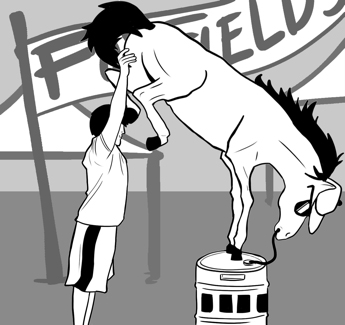For a typical steeplechase race of any significant size or importance, the focus of the day is on the horses and the results. The spring Foxfield Races, however, is not the typical steeplechase race event. One need only approach any college student in the vicinity to get a picture of what a day at the races really consists of. For students, the day is primarily the booze-fuelled social event of the year. But when the event is centered on the social aspect, what happens to the actual sports that are meant to be the focus of the day? Is the horsemanship that Foxfield was founded on paying the price for the ultimate collegiate experience?
The Foxfield Race was first started in 1978 in honor of the Virginian horseman, Grover Vandevender, on his own property in Charlottesville, Va. It was founded on the three principles that most steeplechase courses need to succeed: good competition, quality racing, and horsemanship. Foxfield, however, did something a little different. Unlike most steeplechases, Foxfield is a tailgating event with no grandstands. This leaves all the more room for large collegiate groups, such as Greek organizations, to pretty much do everything but watch the race. Instead, the day typically involves heavy drinking from the moment you wake up and immortalizing a day you can proudly say you don’t remember.
With students making up almost 26 percent of the attendees, it is clear that the attention given to the sport is less than expected. The Foxfield Racing Association president, J. Benjamin Dick, deems the nature of the crowd and their behavior disgraceful. In 2007, Cavalier Daily reported his response to rowdy behavior of the guests: “It’s not a party… Try to see a horse.” In fact, most students are rarely even witness to the equestrian nature of the event. According to one Georgetown student, Mack Feldman (COL ‘15) “[seeing the horse]) really isn’t the point.”
Ah, but it is. Foxfield is a semi-annual event and its infrequency only adds to its high profile within the east coast racing community. Throughout the day there are five races, and in total about 50 horses are involved. The winner of each race has total earnings from $10,000 to $25,000. So, despite being comparatively smaller in size, the event still attracts the highest-quality horses and highest-profile trainers, according to the Foxfield Racing Association Marketing Director.
The tradition of steeplechasing is another factor that should draw the students away from their coolers and to the rails. In fact, the students are already halfway there. One of the key factors of embracing the Foxfield mentality is dressing in your preppiest attire. Rain or shine, the rolling lawns of Foxfield will be filled with bright bowties, seersucker suits, and Lily Pulitzer sundresses. While this is used to chide the upper-middle class nature of the student body of the University of Virginia, the largest school in attendance, it is undeniably an established pinnacle of the event. So is it the booze that’s keeping the students from completing the tradition and actually getting involved in the equestrian aspect of the event?
This could easily be the case. A survey done by the University of Virginia showed that the level of drinking for most students is above that of a typical weekend, UVA football games, and even Halloween. And anyone who has had a significant college experience will appreciate what this means: an absolute ton of drinking. According to the same survey, the average number of drinks consumed was nine. As a result, the University of Virginia has made a notable effort to try and decrease the drinking and, in particular, the accompanying risks. Led by the student run Alcohol and Drug Abuse Prevention Team Student Safety organization, these efforts have resulted in a notable increase of ‘pledged’ non-drinkers at the events. While I am not saying that being sober is the only way to enjoy the true purpose of the event, I do believe that this isn’t going to be possible when you are totally inebriated.
For the races to maintain its standing as a quality race, the students need to learn to appreciate the sportsmanship of the event. For many this is a totally new sports experience and this should be embraced. The horseracing world is in decline already largely due to public perception. Rowdy and unruly behavior by race goers is only going to further cement the decline of the sport due to its negativeperception by the larger public.





